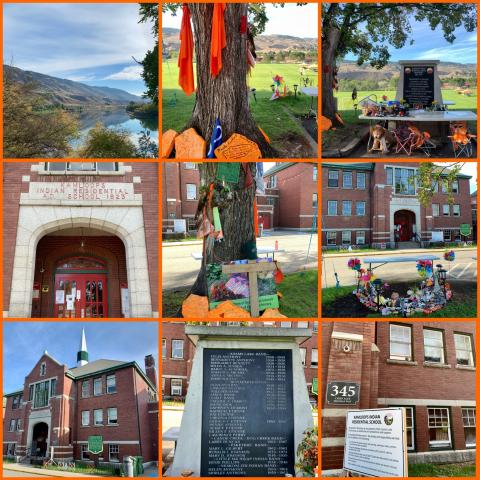
This information may be traumatic for residential school survivors, families, and community. If you are feeling pain or distress, please call the free 24-hour crisis line: 1-866-925-4419. You can also call the First Nations and Inuit Hope for Wellness Help Line at 1-855-242-3310. It's toll-free and open 24 hours a day, 7 days a week.
In the summer of 2021, Tk’emlúps te Secwe̓pemc First Nation was the first among a number of Indigenous communities to share information that it had located unmarked and undocumented burial sites on the property of former residential schools.
This was not “news” to these communities; it had been known and spoken of for years, and it factored significantly into the findings of the Truth and Reconciliation Commission (TRC), established by the Indian Residential Schools Settlement Agreement. This class action responded to thousands of lawsuits filed by residential school survivors against the Government of Canada and the Anglican, Presbyterian, Roman Catholic, and United Churches for abuses committed in nearly 150 residential institutions. The United Church of Canada is responsible for 15 of those institutions. The United Church also operated Teulon Residence in Manitoba, which was not included in the Settlement Agreement. The United Church has been and is supportive of the application of the former Teulon students (see Settlement Agreement Letter below).
The United Church is responding to the issue of unmarked burial sites with an initiative called Bringing the Children Home. It is rooted in our commitment to TRC Calls to Action 73–76; to reparation; and to our Duty of Care, which we have expressed theologically in this way:
Jesus came into the world to bring life in all its fullness. As followers of Jesus we are called to love one another (John 13:34–35), to share our gifts and resources, and to build a community of mutuality and respect (Acts 2:44–47).
As a church, we have a primary duty to care for those who are marginalized, less powerful, or more vulnerable in our community (Deuteronomy 10:17–19; Isaiah 61:1–2).
God intends that all people enjoy a life free from exploitation and abuse. Created in the image of God, everyone has a right to be treated with respect and protected from harm.
Bringing the Children Home
This initiative has three main components:
- Should they wish it, making funds available to Indigenous communities to support the work of identifying unmarked graves, knowledge gathering, commemoration, and ceremony to honour the children who did not return home from these residential institutions.
- Should they wish it, direct provision of all United Church archival records related to residential institutions to these communities.
- Archival and oral history work to create a document index and narrative of all the information we have related to students deaths and burial sites.
A special meeting of the General Council Executive on July 20th, 2021 approved an initial three million dollars to fund this work. The United Church of Canada Foundation is supporting the archival portion of the initiative.
The church brings this forward in the spirit of Moderator Richard Bott’s message to survivors, families, and communities in July 2021:
The United Church of Canada is committed to reconciliation and to transparency in our efforts to support Indigenous leadership, communities, survivors, and families in bringing these children the honour we denied them in life.
Prayers and statements issued on this matter can be found in the Downloads, below.
For any inquiries regarding unmarked burial sites, funding from the Bringing the Children Home initiative, and access to archival material, please email BringingChildrenHome@united-church.ca and we will make sure your questions are answered by the most appropriate member of our team.
Downloads
- Statement to Survivors, Families, and Communities, July 2021 (295.21 KB) (PDF)
- Response to the Church, June 2021 (541.75 KB) (PDF)
- Call for a Time of Mourning and Support, May 2021 (360.29 KB) (PDF)
- A Time of Reflection on Port Alberni: A Pastoral Gathering (54.42 KB) (Word)
- Prayer for Students of Kamloops Residential School (Moderator) (35.18 KB) (Word)
- Prayer for the Loss in Kamloops (Murray Pruden) (35.11 KB) (Word)
- Settlement agreement letter with appendix, July 2017 (301.29 KB) (PDF)